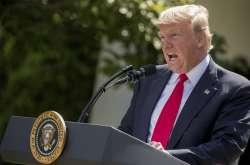Paris climate deal didn't hold India, China accountable on CO2 emissions, says White House
Trump administration defended the move o withdraw from the Paris climate accord saying the landmark agreement did not hold countries like India and China accountable on greenhouse emissions.

A day after US President Donald Trump announced the decision to withdraw from the Paris climate accord, his administration defended the move saying the landmark agreement did not hold countries like India and China accountable on greenhouse emissions.
"As you know, China did not have to take any steps of compliance until 2030. India had no obligations until USD 2.5 trillion of aid was provided," Scott Pruitt, administrator of Environmental Protection Agency (EPA) told reporters at a White House news conference.
Pruitt said, “And Russia, when they set their targets, they set 1990 as their baseline, which allowed them to continue emitting more CO2."
"It (Paris accord) did not hold nations like China and India accountable," he said.
Trump declared Thursday that he was pulling the US from the Paris Agreement on Climate Change as it was not tough on India and China.
"India makes its participation on receiving billions and billions of dollars from developed countries. Paris accord is very unfair at the highest level to the United States. The current India will be allowed to double its coal production and so does China," Trump alleged.
The pact was agreed upon by nearly 190 countries a year and a half ago.
"In this country, we had to have a 26 to 28 per cent reduction in greenhouse gases, which represented the Clean Power Plan and the entire climate action agenda of the past administration," Pruitt told reporters.
Pruitt said Trump made a very courageous decision by pulling out of the Paris Agreement.
"He put America's interests first with respect to environmental agreements and international discussions," he said.
"The discussion over the last several weeks has been one of a thoughtful deliberation. He heard many voices, voices across a wide spectrum of vantage points. The president made a very informed, and I think thoughtful and important decision for the country's benefit.
"What we have to remember when it comes to environmental agreements and international agreements with respect to things like the Paris Agreement is we have nothing to be apologetic about as a country. We had reduced our CO2 footprint to levels of the early 1990s," he asserted.
Pulling out of Paris does not mean disengagement, he said.
"In fact, the president said yesterday that Paris represents a bad deal for this country. It doesn't mean that we're not going to continue the discussion.
"To export our innovation, to export our technology to the rest of the world, to demonstrate how we do it better here is I think a very important message to send," he said.
He indicated that he's going to either reenter Paris or engage in a discussion around a new deal with a commitment to putting America first.
The president has said routinely he's going to put the interest of American citizens at the head of this administration, he said.
"That's in trade policy, that's in national security, that's in border security, that's in right-sizing Washington, DC, and he did that with respect to his decision yesterday on Paris," the top Trump official said.
Noting that the US has significant steps to reduce its CO2 footprint to levels of the pre-1990s, Pruitt said this was achieved largely because of technology, hydraulic fracturing and horizontal drilling, that has allowed a conversion to and natural gas and the generation of electricity.
"You won't hear that from the environmental left. So we need to export clean coal technology, we need to export the technology in natural gas to those around the globe -- India and China -- and help them learn from us on what we've done to achieve good outcomes. We've led with action, not words," Pruitt said.
"Paris, at its core, was a bunch of words committed to very, very minimal environmental benefits and -- cost the country a substantial amount of money and put us at an economic disadvantage," Pruitt said in response to a question.
According to the EPA Administrator, if nations around the globe want to learn from the US on what it is doing to reduce its CO2 footprint, it is going to share that with them.
"That's something that should occur and will occur in the future. We will reach out and reciprocate with nations who seek to achieve that," he asserted.
(With PTI inputs)